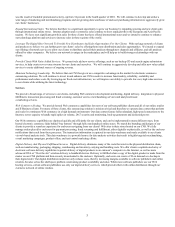Digital River 2002 Annual Report Download - page 21
Download and view the complete annual report
Please find page 21 of the 2002 Digital River annual report below. You can navigate through the pages in the report by either clicking on the pages listed below, or by using the keyword search tool below to find specific information within the annual report.15
Additionally, the Financial Accounting Standards Board is currently considering a proposal to require that the cost of stock options be reflected
as an expense item in financial statements. If this proposal were to be adopted, our recorded expenses would significantly increase, which
would impair our ability to maintain profitability.
Increasing consumer acceptance of the Internet as a medium of commerce is important to the success of our business strategy and our
future revenue growth.
The failure of the Internet to continue developing into a significant commercial medium would harm our ability to increase our revenue and
execute our business strategy. Rapid growth in the acceptance and use of the Internet as an effective medium of commerce is a recent
development. The acceptance and use of the Internet may not continue to develop and a sufficiently broad base of consumers may not adopt and
continue to use the Internet as a medium of commerce. We rely on purchasers who have historically used traditional means of commerce to
purchase goods or transact business. If we are to be successful, these purchasers must accept and use the Internet as a means of purchasing
goods and services and exchanging information. We cannot predict the rate at which these purchasers will do so.
The growth of the market for our services depends on the development and maintenance of the Internet infrastructure.
Our business is based on delivering services over the Internet, and the success of our business therefore depends on the development and
maintenance of a sound Internet infrastructure. This includes maintenance of a reliable network backbone with the necessary speed, data
capacity and security, as well as timely development of complementary products such as high-speed modems, for providing reliable Internet
access and services. Our ability to increase the speed and scope of our services is limited by, and depends upon, the speed and reliability of both
the Internet and our clients’ internal networks. Consequently, as Internet usage increases, the growth of the market for our services depends
upon improvements being made to the Internet as well as to individual client’ s networking infrastructures to alleviate overloading and
congestion. In addition, any delays in the adoption of new standards and protocols required to govern increased levels of Internet activity or
increased governmental regulation may have a detrimental effect on the Internet infrastructure.
Because the electronic commerce industry is highly competitive and has low barriers to entry, we may be unable to compete effectively.
The market for Internet-based, electronic commerce solutions is extremely competitive and we may find ourselves unable to compete
effectively. Because there are relatively low barriers to entry in the electronic commerce market, we expect competition to intensify as current
competitors expand their product offerings and new competitors enter the market. In addition, our clients may become competitors in the future.
Increased competition is likely to result in price reductions, lower average sales prices, reduced margins, longer sales cycles and a decrease or
loss of our market share, any of which could reduce our revenue. We face competition from the following sources:
• in-house development of electronic commerce capabilities;
• other providers of outsourced electronic commerce solutions;
• software publishers and online retailers who have or may choose to make substantial initial and ongoing investments in order to
develop and manage their own electronic commerce sites, and who may decide to market this capability to other companies;
• system integrators and application service providers that offer tools and services for electronic commerce, including companies that
provide a broad range of Internet and server solutions, such as Corio, Inc., Electronic Data Systems Corporation, and IBM Global
Services;
• companies that provide tools and services enabling one or more of the transaction processing functions of electronic commerce, such
as transaction control, data security, customer interaction and database marketing, including BroadVision, Inc. and CyberSource
Corporation;
• companies that sell, distribute or rent software products over the Internet;
• high-traffic, branded Web sites that derive a substantial portion of their revenue from electronic commerce and may themselves offer,
or provide means for others to offer, software products, such as Amazon.com, Inc. and Global Commerce, Inc.; and
• traditional channels and methods of retail and corporate software sales, such as mail order catalogs and retail superstores.
























